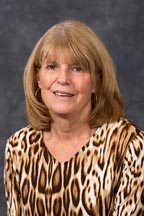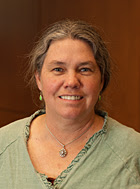 Greetings! My name is Debby Emerson and I am a candidate for a two-year term as Member-at-Large for SustainRT.
Greetings! My name is Debby Emerson and I am a candidate for a two-year term as Member-at-Large for SustainRT.
I was inspired to pursue this because of my involvement with the New York Library Association (NYLA) and its Sustainability Initiative. I’ve been an ALA member for many years, but other than attending annual conferences, I haven’t really been very engaged. I look at this as an opportunity to get involved, share information, and learn from other members of SustainRT.
In 2014, NYLA Council passed a Resolution on the Importance of Sustainable Libraries, recognizing the need to promote the role libraries can play in larger community conversations about resiliency, climate change and a sustainable future for the communities we serve. In the Fall of 2015, a select group of New York’s library leaders came together as Co-Creators to shape strategies to ensure our libraries remain vital, are able to rebound from disruption, and provide on-going value to the communities they serve. The Sustainability Initiative’s purpose statement is:
To create leadership and provide tools to mobilize libraries to think and act sustainably,
In a way that builds awareness and consensus while inspiring action by members of the library community to won their role as sustainability leaders in their communities,
So that communities thrive, bounce back from disruption and are infused with new and better life for everyone.
The group has divided into several working teams: Agents of Change, Benchmarking, Environmental Scan, Making the Case, and Roadmaps. I am part of the Benchmarking team and one of our tasks has been to come up with a list of existing benchmarks by which libraries can assess their sustainability. We specifically looked for existing standards rather than trying to “re-invent the wheel”. The teams have bi-monthly conference calls that keep all the Co-Creators informed about each other’s activities and progress on the initiative as a whole.
The NYLA Sustainability initiative has approached sustainability from the perspective of the Triple Bottom Line: In order for something (a product, policy, institution or community) to be truly sustainable it must meet three criteria: It must be socially equitable, economically feasible, and environmentally sound.
I am the current president of NYLA and I’m very excited to watch the Sustainability Initiative take shape. Each year the president picks a theme for the year and the annual NYLA Conference typically revolves around that theme. I have selected “Strong. Strategic. Sustainable.” as my theme, with the idea that libraries are strong, strategic and sustainable, and we should also see our state professional association as strong, strategic and sustainable.
If elected, I look forward to this opportunity to serve ALA and to learn more about sustainability initiatives from a broader perspective. I will be happy to share information about our efforts in New York State, and grateful to learn from my colleagues in other parts of the country. I can assure you that I will be a contributing member of the group and will enthusiastically tackle whatever comes my way. I’m happy to answer questions about the NYLA Sustainability Initiative and I invite people to contact me at demerson@clrc.org.
